Available 24/7
Available 24/7
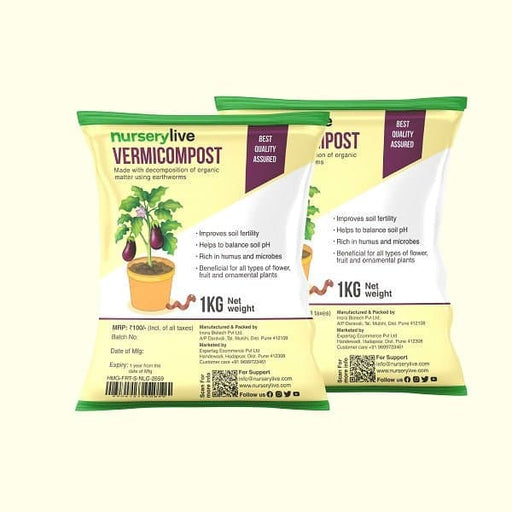 Save 11%
Save 11%
Vermicompost - 1 kg (Set of 2) Enhance your gardening experience with our premium Vermicompost, available in a convenient set of two 1 kg ...
View full details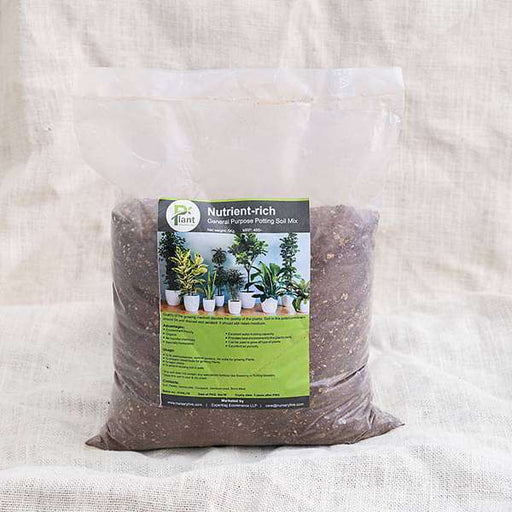
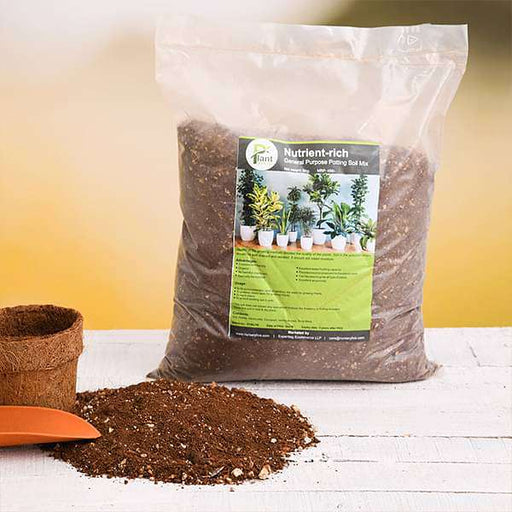 Save 34%
Save 34%
Nutrient-Rich General Purpose Potting Soil Mix - 5 kg Transform your gardening experience with our Nutrient-Rich General Purpose Potting S...
View full details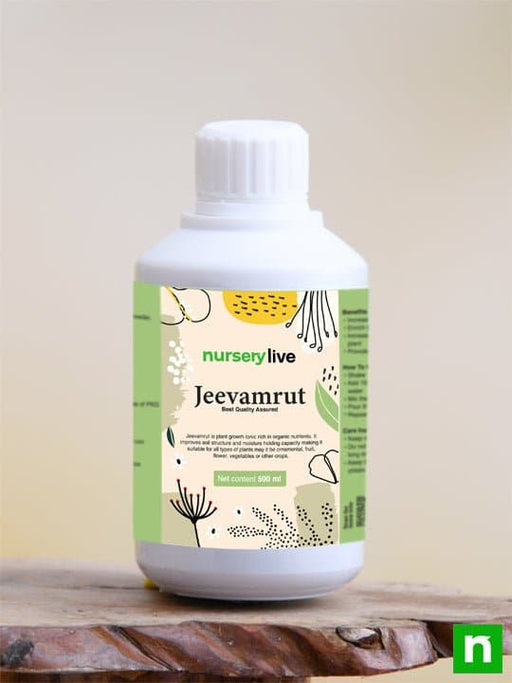
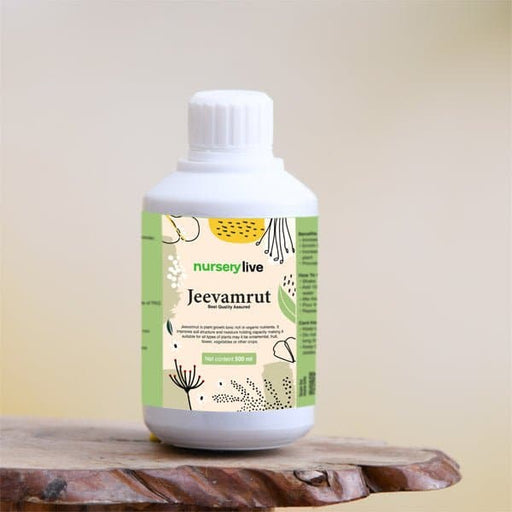 Save 19%
Save 19%
Jeevamrut (Plant Growth Tonic) - 500 ml Unlock the full potential of your plants with Jeevamrut, a premium plant growth tonic designed to ...
View full details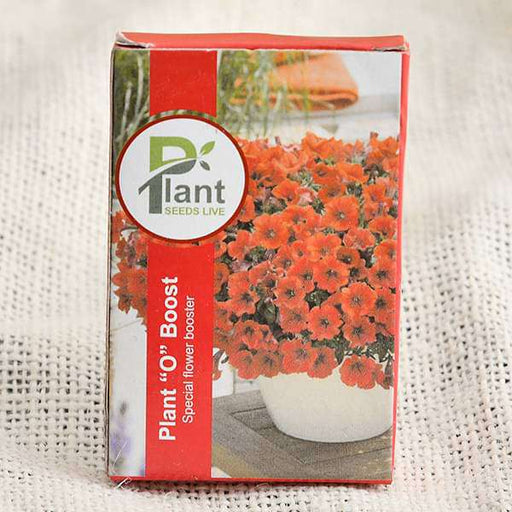
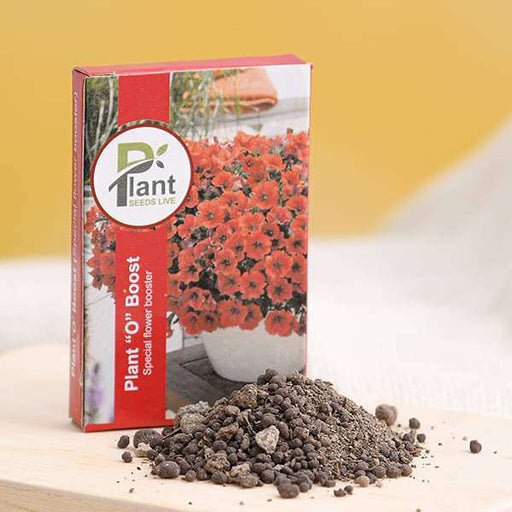 Save 20%
Save 20%
Plant O Boost (Special Flower Booster, 10 g) - Set of 10 Unlock the full potential of your garden with Plant O Boost, a premium special fl...
View full details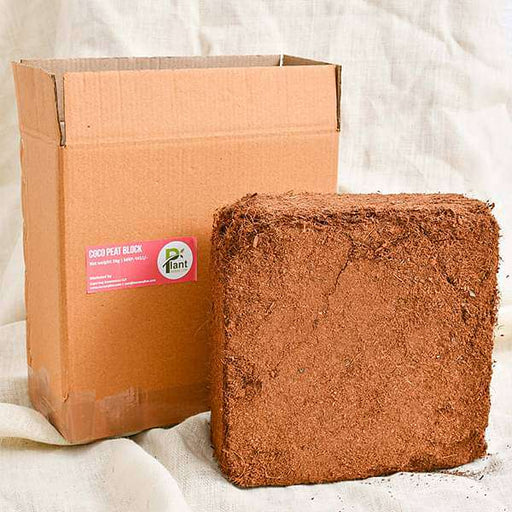
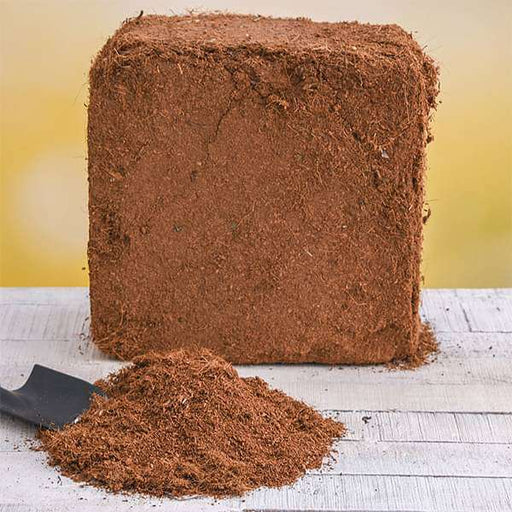 Save 8%
Save 8%
Coco Peat Block - 4 kg (Expands Up to 60 - 70 L) Transform your gardening experience with our premium Coco Peat Block, weighing 4 kg and c...
View full details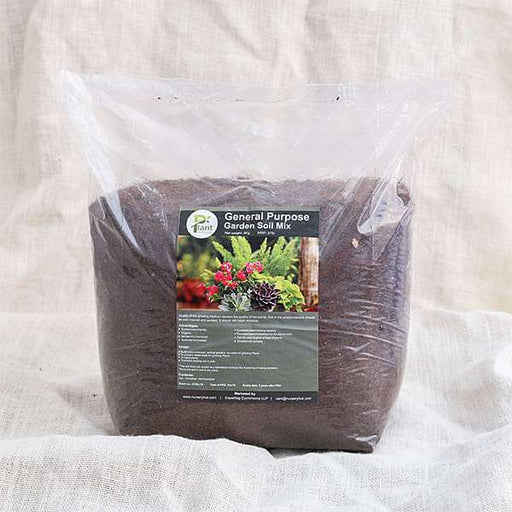
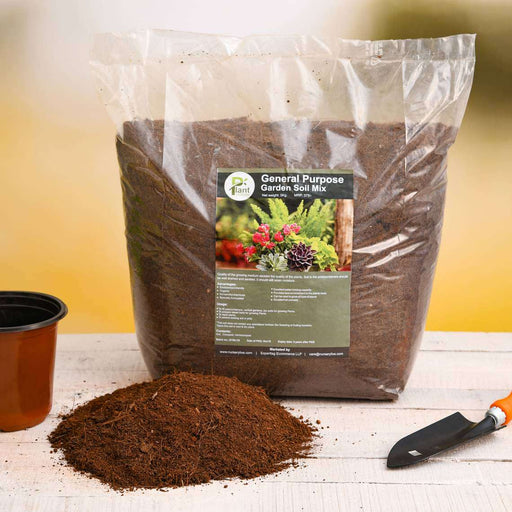 Save 31%
Save 31%
General Purpose Garden Potting Soil Mix - 5 kg Transform your gardening experience with our General Purpose Garden Potting Soil Mix. This ...
View full details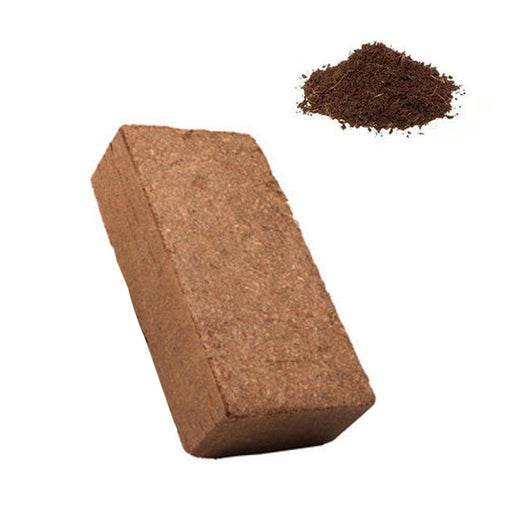 Save 20%
Save 20%
Coco Peat Block - 600 g (Expands Up to 5 - 8 L) Transform your gardening experience with our premium Coco Peat Block, weighing 600 grams a...
View full details
 Save 35%
Save 35%
Best 6 Plants for Perfect Indoor Garden Transform your living space into a lush oasis with our curated collection of the Best 6 Plants for a...
View full details
 Save up to 50%
Save up to 50%
Mini Succulent Garden Pack Transform your space with our Mini Succulent Garden Pack, featuring a delightful collection of 4 any variety beautiful s...
View full details
 Save 30%
Save 30%
5 Best Fragrant Plants Transform your garden or indoor space into a fragrant paradise with our curated selection of the 5 Best Fragrant Plants. Th...
View full details
 Save 24%
Save 24%
Set of 2 Bonsai Looking Grafted Adeniums Transform your indoor or outdoor space with our exquisite Set of 2 Bonsai Looking Grafted Adenium...
View full details Save 45%
Save 45%
Top 4 Die Hard Succulents Pack Transform your indoor or outdoor space with our Top 4 Die Hard Succulents Pack, featuring a curated selecti...
View full details
 Save 30%
Save 30%
5 Best Indoor Plants Pack Transform your living space into a lush oasis with our '5 Best Indoor Plants Pack.' This carefully curated collection fe...
View full details
 Save 25%
Save 25%
Set of 4 Evergreen Air Purifier Plant Pack Transform your indoor space into a lush, green oasis with our Set of 4 Evergreen Air Purifier Pla...
View full detailsThe foundation of a good garden is soil enrichment. The trick is to add organic materials compost and homemade plant food natural fertiliser.
Organic manure can be made at home in a matter of minutes. You can turn your trash into rich organic manure and use it to grow flowers veggies and plants.
To begin divide your household garbage into dry and wet categories in your kitchen and place both types of waste in separate containers. Then to begin the decomposition process add dry leaves in the same quantity as the trash and semi-composted material buttermilk or cow dung. When the pot is full leave it open for 30-45 days to allow the composition to take place.
The garbage will decompose into nutritious compost after two months.
Animal waste from meat processing peat manure slurry and guano are all examples of naturally occurring organic fertilisers.
They can be made right on the farm. They are always more readily available because they are made from locally sourced materials.
Manure which is created from animal excreta cow dung and goat droppings Compost which is organic matter decomposed by composting and Bone Meal which is a mix of crushed slaughterhouse waste products like animal bones are all excellent organic fertilisers for your plants.
Vermicompost a product of organic material degradation employing various species of worms to form a heterogeneous combination of decaying food waste is another organic fertiliser that is beneficial to your plants.
Organic fertilisers help plants in your garden thrive by supplementing the nutrients already present in the soil.
Organic plant fertilisers release nutrients slowly over time and typically contain traces of additional components that plants and crops may require for healthier and stronger growth. Organic fertilisers provide a well-balanced mix of nutrient sources that are critical for the soils key microbes and earthworms.
Using organic products for gardens farming and agriculture has a slew of wonderful advantages like being ecologically friendly and safe.
Mined rock minerals as well as natural plant and animal waste are used to make organic fertilizers. Manure guano dried and powdered blood ground bone crushed shells finely pulverised fish phosphate rock and wood are among the components of organic fertilizer.
They can also be highly processed items that are made from compost or manure. Soil structure improves as a result of the organic matter in organic fertiliser and the soils ability to store water and nutrients improves as a result. They are capable of resolving issues caused by synthetic fertilisers.
They reduce the need to apply synthetic fertilisers on a regular basis to maintain soil fertility.
Compost is a type of organic fertilizer that is made from decomposed organic matter. It is rich in nutrients and can improve soil health and fertility.
Vermicompost is a type of compost that is made using earthworms to break down organic matter. It is high in nutrients and can help improve soil structure and water retention.
Manure is a type of organic fertilizer that is made from animal waste. It is rich in nutrients and can help improve soil health and fertility.
Bone meal is a type of organic fertilizer that is made from ground-up animal bones. It is high in phosphorus and can help promote healthy root growth.
Blood meal is a type of organic fertilizer that is made from dried blood. It is high in nitrogen and can help promote healthy leaf growth.
Fish emulsion is a type of organic fertilizer that is made from fish waste. It is high in nitrogen and can help promote healthy leaf growth and flowering.
Seaweed is a type of organic fertilizer that is made from dried seaweed. It is high in micronutrients and can help improve soil health and plant growth.
Alfalfa meal is a type of organic fertilizer that is made from dried alfalfa plants. It is high in nitrogen and can help promote healthy plant growth.
Compost tea is a type of organic fertilizer that is made by steeping compost in water. It is rich in nutrients and can be applied directly to plants or used as a soil drench.
Green manure is a type of organic fertilizer that is made from growing crops specifically for the purpose of being turned back into the soil. It can help improve soil health and fertility.
Bat guano is a type of organic fertilizer that is made from bat droppings. It is high in nitrogen and phosphorus and can help promote healthy plant growth.
Worm castings are a type of organic fertilizer that is made from earthworm waste. They are rich in nutrients and can help improve soil structure and water retention.
Chicken manure is a type of organic fertilizer that is made from chicken waste. It is high in nitrogen and can help promote healthy plant growth.
Horse manure is a type of organic fertilizer that is made from horse waste. It is rich in nutrients and can help improve soil health and fertility.
Cow manure is a type of organic fertilizer that is made from cow waste. It is high in nitrogen and can help promote healthy plant growth.
Organic liquid fertilizer is a type of organic fertilizer that is applied as a liquid. It is typically made from plant or animal waste and can be used to feed plants directly through their roots or foliage.
Green compost is a type of compost that is made from green plant material, such as grass clippings and leaves. It is high in nitrogen and can help promote healthy plant growth.
Biofertilizers are a type of organic fertilizer that contain beneficial microorganisms, such as bacteria and fungi. They can help improve soil health and fertility.
Rock phosphate is a type of organic fertilizer that is made from phosphate rock. It is high in phosphorus and can help promote healthy root growth.
Kelp meal is a type of organic fertilizer that is made from dried and ground-up seaweed. It is high in micronutrients and can help improve soil health and plant growth.
Organic fertilizer is a type of fertilizer made from natural and organic materials, such as animal waste, plant residues, and compost. It is free from harmful chemicals and provides nutrients to plants in a slow-release manner.
Organic fertilizer is a sustainable and environmentally friendly way to nourish plants. It improves soil structure, promotes microbial activity, and reduces the risk of soil erosion. Additionally, it is safe for wildlife and does not pollute groundwater.
Organic fertilizer provides essential nutrients to plants in a slow-release manner, allowing for steady growth and development. It also promotes soil health by enhancing microbial activity, improving soil structure, and increasing water retention capacity.
Organic fertilizer is considered better than synthetic fertilizer because it is sustainable, environmentally friendly, and provides long-term benefits to soil health. Synthetic fertilizers, on the other hand, are made from chemicals and can harm soil health and the environment.
Yes, organic fertilizer can be used on all types of plants, including flowers, fruits, vegetables, and trees. However, the amount and frequency of application may vary depending on the plant's needs and growth stage.
Yes, organic fertilizer is safe for human health as it is free from harmful chemicals and toxins. It is also eco-friendly and does not cause harm to wildlife or the environment.
Organic fertilizer can burn plants if it is applied in excess or not mixed properly. It is essential to follow the recommended dosage and application instructions to avoid nutrient burn.
Organic fertilizer does not attract pests if it is properly composted and applied. However, if the composting process is not done correctly, it can attract pests.
Organic fertilizer can lose its effectiveness over time, but it does not have an expiration date like synthetic fertilizer. It is recommended to use fresh organic fertilizer for best results.
Yes, organic fertilizer can be used in hydroponic systems. However, it is essential to choose a fertilizer that is specifically formulated for hydroponics and is water-soluble.
The amount of organic fertilizer to use depends on the plant's needs, soil quality, and growth stage. It is recommended to follow the label instructions and use the recommended dosage.
Yes, organic fertilizer can be used with chemical fertilizers. However, it is essential to avoid over-fertilizing the plants and follow the recommended dosage.
No, organic fertilizer cannot replace the need for pesticides. Pesticides are used to control pests and diseases, while organic fertilizer provides essential nutrients to plants.
Yes, organic fertilizer can be used in the winter. However, the frequency of application may be reduced as plants require less nutrients during the dormant season.
Yes, organic fertilizer can improve soil quality by promoting microbial activity, improving soil structure, and increasing water retention capacity.
Yes, you can make your own organic fertilizer by using organic waste materials, such as vegetable peels, eggshells, coffee grounds, and grass clippings. These materials can be composted and used as a nutrient-rich fertilizer.
Answer: The frequency of application will depend on the type of organic fertilizer you are using, as well as the needs of your plants.
Answer: Organic fertilizers typically release nutrients slowly and do not burn plants. However, applying too much organic fertilizer can lead to nutrient buildup in the soil, which can damage plant roots and cause leaf scorch. It is important to follow the recommended application rates and guidelines for the specific organic fertilizer you are using.
Answer: Organic fertilizers are generally safe for pets and children when used according to the instructions. However, it is always a good idea to keep pets and children away from the area where the fertilizer has been applied until it has been watered in or absorbed into the soil.
Answer: Yes, organic fertilizers can be used in hydroponic systems. However, it is important to choose an organic fertilizer that is specifically formulated for hydroponics, as traditional organic fertilizers may not dissolve properly in the water and can clog the system.
Answer: Yes, organic fertilizers can be used for indoor plants. In fact, they can be a great choice for indoor plants because they release nutrients slowly over time, which reduces the risk of over-fertilization and nutrient burn.
Answer: Look for organic fertilizers that have a balanced nutrient content and a high percentage of organic matter. The label should clearly list the nutrient content and application instructions. Additionally, look for organic fertilizers that are certified by a reputable organization, such as the USDA or OMRI, which ensures that the product meets certain standards for organic farming.